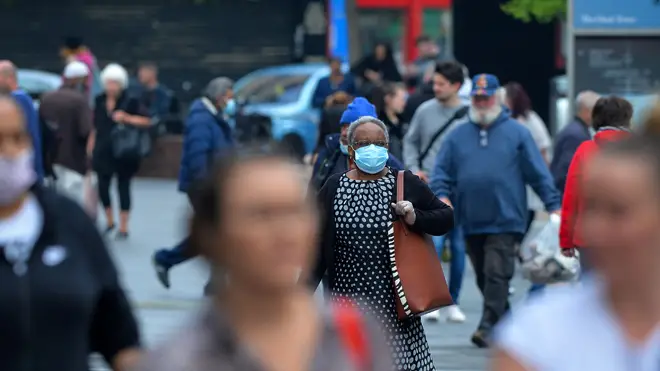
Oli Dugmore 4am - 7am
22 October 2020, 08:55

A government expert has said he does not believe structural racism played a role in the healthcare outcomes of BAME people during the first wave of the Covid-19 pandemic.
The remarks of Dr Raghib Ali come as the government is due to set out plans to tackle the disproportionate effect Covid-19 is having on people from Black, Asian or ethnically diverse backgrounds.
A report has found a range of factors contributed to the higher infection and mortality rates and the equalities minister will outline later the measures being taken to protect those at risk.
Read more: Chancellor to unveil tier two support package
Dr Ali, who is senior clinical research associate at the University of Cambridge's MRC epidemiology unit, said that, instead of focusing on ethnicity as a potential risk factor for severe Covid-19, individuals should have a "personalised risk assessment" to determine how likely they are to become critically ill with the disease.
He said: "If structural racism was an important problem, not saying it doesn't exist, but if it was an important problem in healthcare outcomes, you'd expect it to be reflected not just in Covid but with other outcomes as well.
"But the truth, as we know from data, particularly from Scotland but also from England, is that most of ethnic minority groups actually have better overall health and lower rates of all-cause mortality than white groups."
Dr Ali, who was involved in the Government's first quarterly report on progress to address Covid-19 health inequalities, said that the spotlight should be on risk factors such as obesity, age, population density, occupational exposure and overcrowded housing, involving not just the ethnic minorities but the population as a whole.
He said: "We have to adjust the risk factors rather than just saying it's ethnicity, so the purpose of adjusting is to try to understand what's causing that increased risk in blacks and south Asians.
"Of course, they still have an increased risk (that is) maybe two, three times (that of white people), depending on which papers you look at."
He added: "You have to target the risk factors because ethnicity is basically a proxy for those risk factors."
Dr Ali, who is set to become one of the the Government's new expert advisers on Covid-19 and ethnicity, said that in the early stages of the pandemic, it was reasonable to use ethnicity as a proxy because there was not enough information about the disease.
But as new evidence comes to light, he said "it doesn't make sense to put all minorities into the same basket" because not everyone from those communities is at higher risk of becoming critically ill or dying.
Dr Ali said that the problem with focusing on ethnicity means it "misses the very large number of non-ethnic minority groups and whites who also lived in deprived areas, who also live in overcrowded housing".
The Government's Covid-19 health inequalities report, which was published on October 22, looks at the effectiveness and impact of the current actions being undertaken to lessen disparities in infection and death rates of Covid-19.
According to the report, evidence shows an increased risk for black and south Asian ethnic groups but the relative risk of Covid-19 mortality is reduced when taking into account socioeconomic and geographical factors associated with different ethnic groups.
The report said: "Where people live, particularly in London and other cities, has had a large effect on the risk of individuals catching Covid-19.
"The current evidence clearly shows that a range of socioeconomic and geographical factors such as occupational exposure, population density, household composition and pre-existing health conditions may contribute to the higher infection and mortality rates for ethnic minority groups.
"Deprivation is a good marker of many of these factors."
It added: "Most of the increased risk for ethnic minorities is readily explained by these factors but it is not fully explained for some groups such as black men.
"A number of additional socioeconomic factors are under investigation."
The report comes after the IPPR and the Runnymede Trust recently estimated almost 60,000 more deaths involving coronavirus could have occurred in England and Wales if white people faced the same risk as black communities, and 35,000 more white people could have died if the risk was the same as for the south Asian population.
Commenting on the Government report, Dr Parth Patel, IPPR research fellow, said: "This report is welcome, but the measures announced are not even close to tackling the scale of the inequality.
"The Government should be acting to address the underlying structures behind ethnic disparities.
"This means protecting minority ethnic communities so they're less likely to catch Covid-19, and increasing access to treatment once they have it.
"Failure to act quickly will lead to thousands of unnecessary deaths during this second wave, this is about public health as much as it's about racial justice.
"Inequalities fuel pandemics."